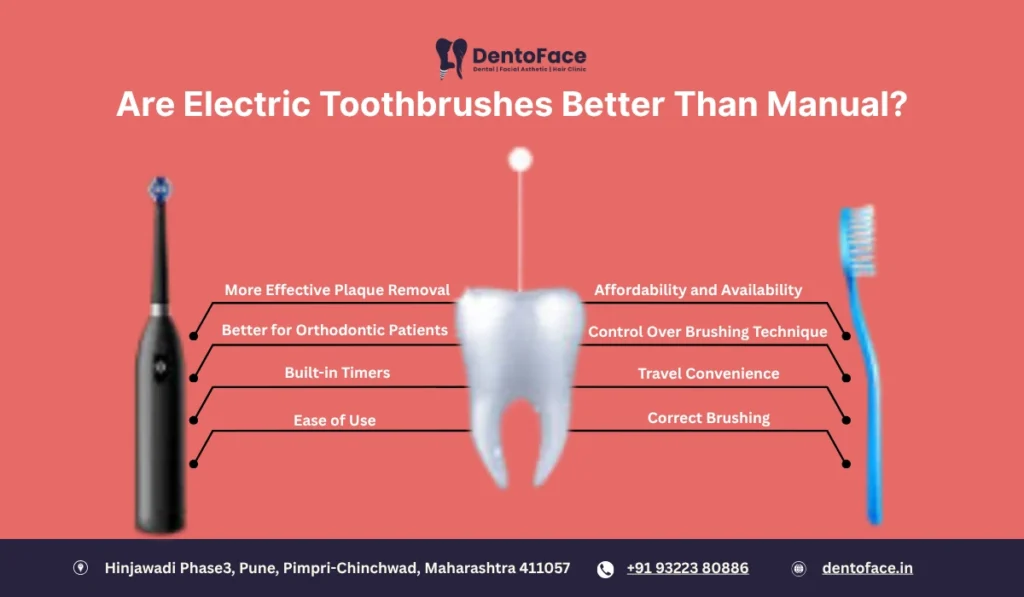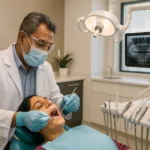Maintaining good oral hygiene starts with the right toothbrush. Many people wonder whether switching to an electric toothbrush truly offers better cleaning compared to a manual one. At Dentoface – a trusted dental clinic in Hinjewadi, our dental experts emphasize that the best toothbrush is the one that suits your individual needs, brushing habits, and comfort. However, understanding the key differences between the two can help you make an informed choice for long-term dental health.
Understanding the Basics: Manual vs. Electric Toothbrushes
A manual toothbrush is the traditional type most people are familiar with. It requires hand movement to brush effectively and comes in various bristle types and sizes.
An electric toothbrush, on the other hand, uses automated oscillating or sonic movements to remove plaque with minimal effort. These brushes often include features like pressure sensors, built-in timers, and multiple brushing modes.
Benefits of Electric Toothbrushes
- More Effective Plaque Removal
Studies have shown that electric toothbrushes, especially those with rotating-oscillating heads, can remove more plaque compared to manual brushes. This helps reduce gingivitis and prevent cavities more efficiently. - Ease of Use
Electric toothbrushes do most of the work for you. They are especially helpful for children, elderly individuals, and those with limited hand mobility. - Built-in Timers
Most electric brushes include a timer that ensures you brush for the dentist-recommended two minutes, improving overall brushing consistency. - Pressure Sensors and Smart Features
Some advanced models come with sensors that alert you if you’re brushing too hard, preventing enamel wear and gum damage. - Better for Orthodontic Patients
For individuals with braces or aligners, electric toothbrushes can clean around brackets and wires more effectively than manual ones.
Advantages of Manual Toothbrushes
- Affordability and Availability
Manual toothbrushes are budget-friendly and easy to find anywhere. They don’t require charging or replacement parts. - Control Over Brushing Technique
Some people prefer the control they have with a manual brush, allowing them to adjust pressure and angles as needed. - Travel Convenience
Lightweight and compact, manual toothbrushes are ideal for travel without the need for chargers or batteries. - Proper Technique Can Be Just as Effective
When used correctly—with circular motions and adequate time—a manual toothbrush can clean your teeth just as effectively as an electric one.
Which One is Better? Expert Opinion from a Dentist in Hinjewadi
From a professional standpoint, both electric and manual toothbrushes can maintain good oral hygiene if used properly. However, electric toothbrushes tend to provide more consistent and thorough cleaning, especially for people who struggle to maintain proper brushing techniques.
At Dentoface, our experienced dentists in Hinjewadi recommend electric toothbrushes for patients with gum issues, braces, or limited hand dexterity. For others, a good-quality manual brush combined with correct brushing habits works equally well.
Tips for Effective Brushing (Regardless of Type)
- Brush twice daily for at least two minutes.
- Use a fluoride toothpaste to strengthen enamel.
- Replace your toothbrush or brush head every 3–4 months.
- Avoid brushing too hard—gentle, circular motions are most effective.
- Don’t forget to clean your tongue and floss daily.
Common Myths About Electric Toothbrushes
Myth 1: Electric toothbrushes damage enamel.
Fact: When used correctly, they’re safe and often gentler due to pressure sensors.
Myth 2: Only expensive electric toothbrushes work well.
Fact: Even budget-friendly models can provide superior cleaning compared to manual brushes.
Myth 3: Electric brushes are for lazy people.
Fact: They’re designed for efficiency and better oral health, not convenience alone.
Environmental Considerations
While manual toothbrushes are mostly plastic-based, electric ones have reusable handles and replaceable heads. Some eco-friendly brands now offer recyclable options for both types. Choosing biodegradable manual brushes or rechargeable electric ones can reduce environmental impact.
When to Consult a Dentist
If you notice persistent bad breath, bleeding gums, or tooth sensitivity, it’s best to seek professional advice. Visiting a dental clinic in Hinjewadi Phase3 like Dentoface allows experts to assess your oral health and recommend the best toothbrush and hygiene practices tailored to your needs.
Conclusion
Both electric and manual toothbrushes can help you achieve excellent oral hygiene when used properly. The right choice depends on your brushing habits, dental health, and comfort. Regular dental check-ups and cleanings play an equally important role in maintaining healthy teeth and gums.
For personalized oral care advice, visit Dentoface – your trusted dentist in Hinjewadi. Our dental experts are here to guide you toward a cleaner, brighter, and healthier smile.
Read Here: Tooth Sensitivity: Common Causes and How to Prevent It
FAQs
- Which toothbrush is better for sensitive gums?
Electric toothbrushes with soft bristles and pressure sensors are generally gentler on gums. - How often should I replace my toothbrush head?
Every 3–4 months, or sooner if the bristles appear frayed. - Can children use electric toothbrushes?
Yes, but choose age-appropriate models with smaller heads and gentle modes. - Is it okay to switch between electric and manual toothbrushes?
Absolutely. You can alternate between the two based on convenience and comfort. - Is electric toothbrush better than normal?
Yes, an electric toothbrush is generally better than a normal one because it removes more plaque, reduces gum disease, and ensures consistent brushing with built-in timers and pressure control. However, a manual toothbrush used with proper technique can be just as effective for maintaining good oral health.








